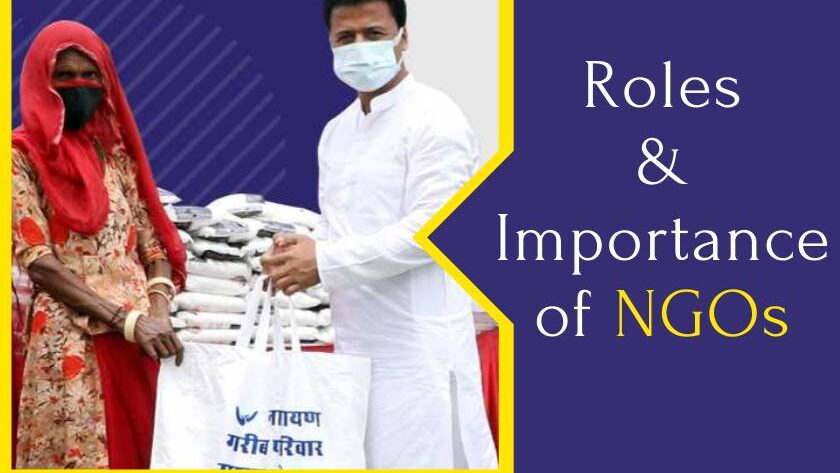Non-governmental organisations or NGOs are organizations that engage in a wide range of activities for the betterment of underprivileged individuals and society as a whole. As the name suggests, non-governmental organizations (NGOs) operate independently, with no financial help from the government, however, they may work in close collaboration with government agencies to carry out their projects.
NGO services in India carry out projects to improve the well-being of the communities with which they work. They work to address numerous concerns and issues that exist in society. NGOs are non-profit organizations, which mean they have no commercial interests. Individuals, corporations, and institutions make donations to non-governmental organizations (NGOs). They participate in fundraising activities to raise funds for the work they conduct. Since India’s independence, non-governmental organizations (NGOs) have played a key role in helping the poor, offering aid to the distressed, and improving the socioeconomic status of thousands of people.
Roles of NGOs in Indi
NGOs play the following five roles that are quite important:
Infrastructure Development and Operation
Community-based groups and cooperatives can obtain, subdivide, and develop land, build houses, supply infrastructure, and maintain and operate facilities such as wells or public toilets and solid waste collection services. They can also establish building supply stores and other community-based economic ventures. In many circumstances, they will require technical assistance or guidance from government agencies or higher-level, non-governmental organisations.
Supporting Advancement, Demonstration, and Pilot Projects
Non-governmental organisations (NGOs) have the advantage of selecting specific places for new projects and specifying in advance the duration they will support the project – overcoming some of the drawbacks that governments face in this regard. Because of their ability to move faster than official bureaucracy, NGOs can also serve as projects for larger government programs.
Communication Facilitation
NGOs can help individuals communicate with the government and vice versa. Communication upward includes telling the government about what local residents are thinking, doing, and feeling, whereas communication downward is informing local residents about what the government is planning and doing. Non-governmental organisations (NGOs) are also in a better position to share knowledge horizontally andnetwork with other groups, performing similar activities.
Technical Support and Training
Training institutions and non-governmental organisations (NGOs) can build technical assistance and training courses to help both CBOs and governments.
Monitoring, Researching, and Evaluation
Innovative efforts thoroughly documented and shared by NGOs; efficient participatory monitoring would allow for the sharing of outcomes with both the participants and the project staff.
Importance of NGOs
In the last seven decades, India has experienced massive socio-economic progress. Millions of people have been lifted out of poverty, life expectancy has increased, literacy rates have nearly tripled, and people now have improved access to healthcare services. However, considering India’s vastness, both in terms of demography and geography, as well as its socio-cultural diversity, millions still remain without a decent life.
Even today, many individuals struggle to obtain basic necessities such as healthcare, shelter, education, and nutritional food. The advantages of India’s economic success have not been evenly distributed. There is a great deal of economic inequality. This is where non-governmental organisations (NGOs) come into the picture.
- Their mission is to fill the gap by bettering the lives of the most marginalised groups.
- In India, most trusted NGOs engage in a wide range of activities, and the majority of which attempt to improve the socioeconomic status of people with minimal resources.
- NGOs’ work has a far-reaching role in helping underprivileged and poverty-stricken people march forward in life. They do so by providing immediate benefits (such as distributing nutrition feed to malnourished children) to enabling and empowering people (such as making a community realise the importance of sending their children to school).
The work of NGO services in India contributes significantly to national development. With the Corporate Social Responsibility (CSR) Act requiring large corporations to spend 2% of their profits on social causes, non-governmental organisations (NGOs) have the ability to impact the lives of millions of people through their activities. Over time, non-governmental organisations (NGOs) have streamlined their operations and expanded their scales.
The management of established NGOs is similar to that of large business organisations which means there are well-defined KPIs and goals to meet. NGOs must be honest in their operations and ensure that the funds raised benefit the people, for whom they are meant. This is a positive change as more and more people are now associated with NGOs.Larger and more accountable non-governmental organisations will be able to deliver more effectively and efficiently, making the best use of resources. Most trusted NGOs are already proving to be change-makers. They will continue to play an important role in helping broad segments of Indian society to emerge from the quicksand of poverty and hardship in the future.




